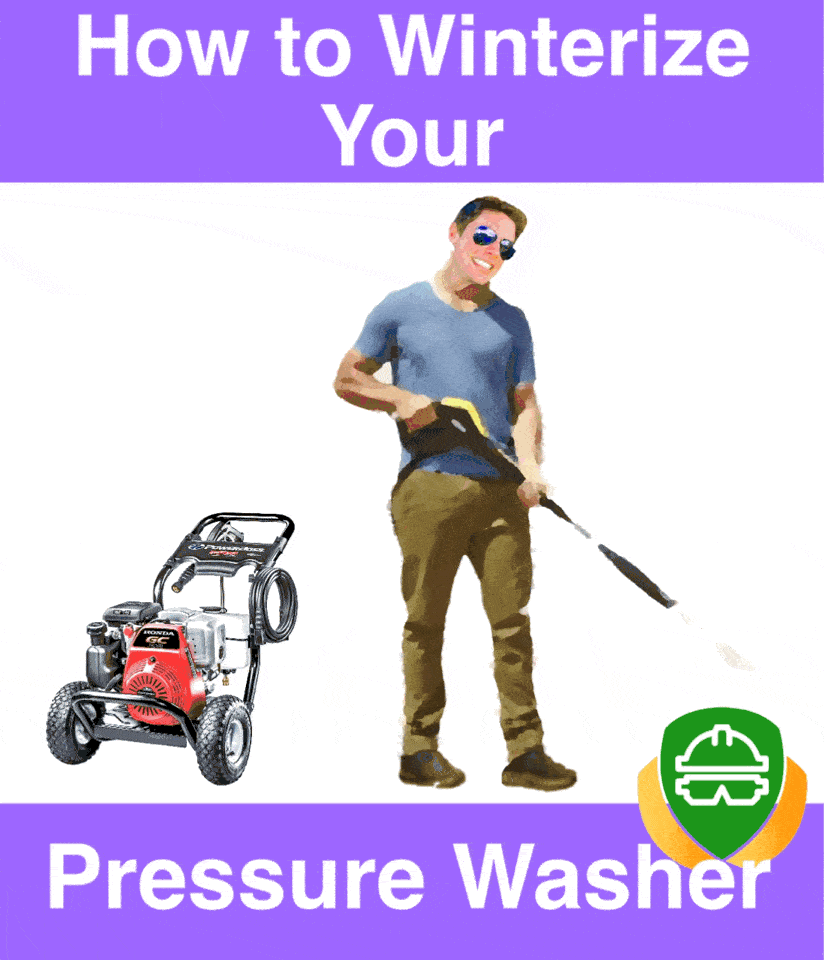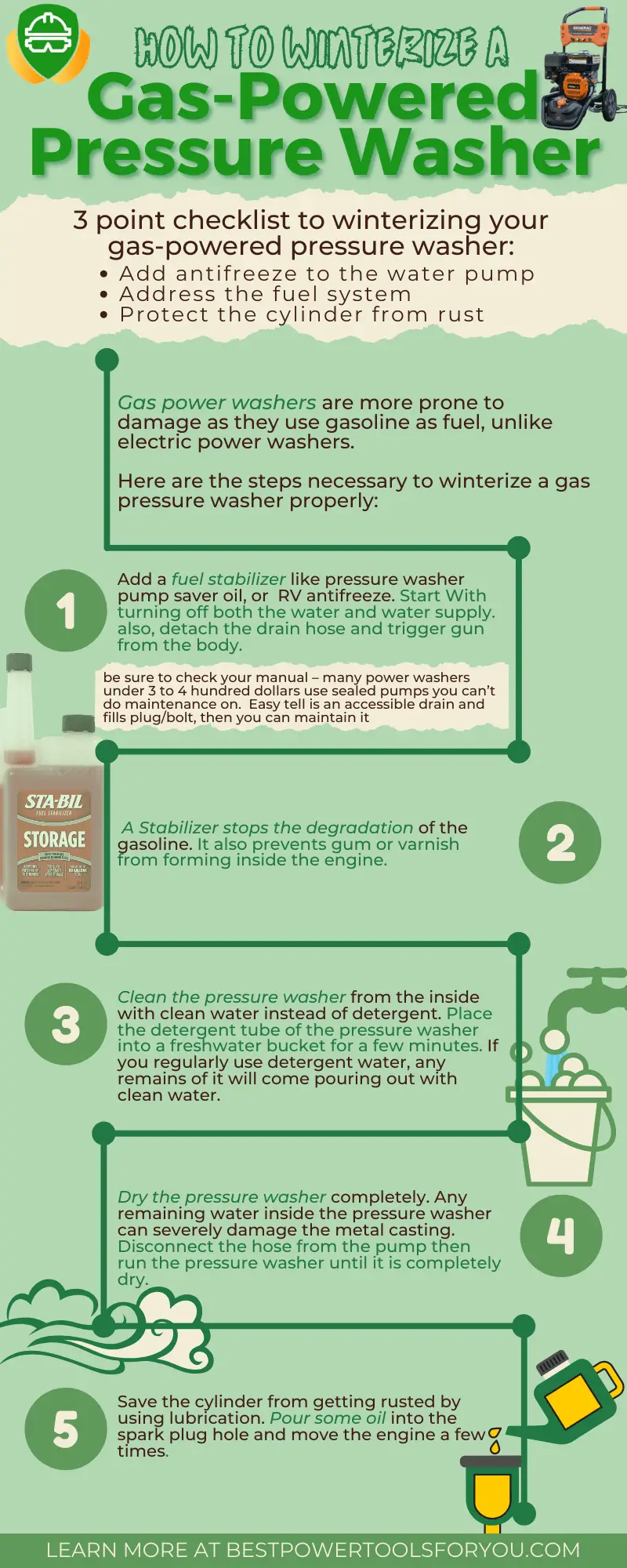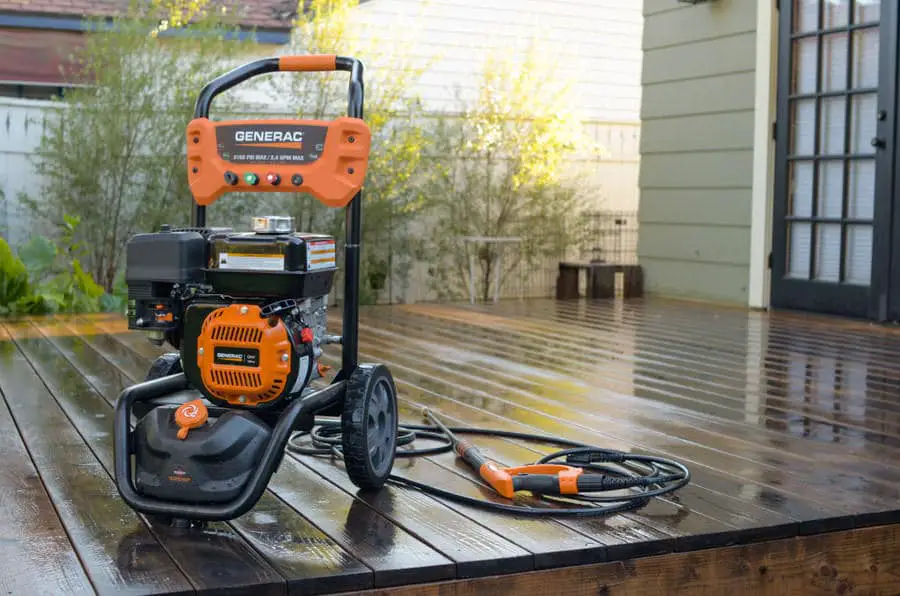Can a pressure washer freeze?
It’s easy to think of these as weed wackers instead of plumbing. Just throw it in the shed until next spring. But your weed eater and lawn mower don’t have any water in them. Physics 101, water expands in freezing temperatures creating enough force to split boulders. Your power washer doesn’t stand a chance…

But its only a minor hassel to get your pressure washer winter ready. Wondering how to winterize a pressure washer pump? Keep reading.
Check the bottom of this post for some essential items for this process.
The Necessity of Winterizing A Pressure Washer
I know it’s a pain. But winterizing your equipment needs to be as regular and scheduled as spring cleaning.
Let’s say after a long winter in one bright summer day, you’re ready to go to work with your less than a year old pressure washer to wash your house siding. Then, the Saturday afternoon set aside just for this project, turns into repair time instead… And if you send it to the power washer store for repairs then you’ll face the question of repairing the machine or just buying a new one ’cause costs might just be comparable.
Are you sure you want to go through this?
If you are thinking “ but hold on, isn’t my warranty supposed to cover all that?” Sadly the answer is no.
If the user fails to winterize and drain the pressure washer, the manufacturer’s warranty does not cover the damage. Primarily all of the manufacturers of pressure washer highlight this one particular fact.
Focus On This Step By Step Winterizing Process:

How to Winterize a Gas-Powered Pressure Washer?
Winterizing your gas powered pressure washer really entails 3 different systems:
- adding antifreeze to the water pump
- addressing the fuel system
- and protecting the cylinder from rust

- Gas power washers are more prone to damage as it works on the actual fuel, unlike its electric counterpart. If you slack off on the maintenance required before storing it for the winter, it can get pretty catastrophic. So here are the steps necessary to winterize a pressure washer(gas) properly.
- You will need a fuel stabilizer for your Ryobi pressure washer or any power washer that burns dinosaur bones, pressure washer pump saver oil or RV antifreeze (be sure to check your manual – many power washers under 3 to 4 hundred dollars use sealed pumps you can’t do maintenance on. Easy tell is an accessible drain and fill plug/bolt, then you can maintain it). Start With turning off both the water and water supply. also, detach drain hose and trigger gun from the body.
- Gas pressure washer needs stabilizers. Stabilizers force the gasoline fuel to not to become degraded. It also prevents gum or harmful varnish from forming inside the engine.
- To clean the pressure washer from inside you need to run it with clean water instead of any detergent water. Place the detergent tube of the pressure washer into a freshwater bucket and continue for a few minutes. If you regularly use detergent water, any remains of it will come pouring out with the clean water.
- Dry the pressure washer completely. Otherwise, any remaining if the water inside the pressure washer can severely damage the metal casting. Disconnect the hose from the pump then run the pressure washer until there is any water left.
- To save the cylinder from getting rusty, use oils. Pour some oils into the spark plug hole and move the engine a few times. Use the starter to make sure the cylinder is properly It will help to keep it well during the winter.
Ready for some visuals, check out this video:
How to winterize an Electric Pressure Washer?
An electric pressure washer is a bit different from the gas-powered ones. It doesn’t run on fuels like gasoline or ethanol.
Stall gasoline is one of the main reason for pressure washer damage. But luckily with the electric pressure washer, you need to winterize the pump with only the pump saver.
So the required steps of winterizing an electric pressure washer are bit different, but it’s manageable. Be sure to check your manual.
Here are the basic steps:
- First of all, load your detergent container with lukewarm to hot water. Or place a suction tube right into a bottle of warm water and turn on your machine. It will eliminate any detergent residue that was going to stuck inside. It’s set for the next step once all the chemical waste is cleaned
- You need to disassemble the pressure washing machine components. So, start with disconnecting the lance and hose from the machine, make sure to drain any water that is left in it. Before coiling it the hose for storing, raise it as much as you can to drain out any remaining water.
- Power up the pressure washing machine once more, this time without the hose and also lance attached. The goal right here is to stir out the water that’s left inside out of the system. So turn your washer on and gently shake for about 20 seconds.
- Now as we have winterized all the components and hose pipes by draining all the water, it is time to prepare for its final storage place. Make sure the electric pressure washer storage has no chance of water leaking in.
Extra Tips
My recommendation is to use a cover for your pressure washer. This is going to protect the pressure washer from dust and rust.
Leaving your pressure washer open to weather is not a good idea.
Classic Accessories 79507 Gas Pressure Washer Cover, Black
Check Details and Price on Amazon
WEN PW31C Universal Weatherproof Pressure Washer Cover
Check Details and Price on Amazon
Both of these pressure washer covers are great. You can check them on Amazon by clicking the image.
What is Pressure Washer Pump Saver?
Typically, this is a unique mixture of lubricant and anti-freeze formula. Its sole purpose is to lubricate the pump piston and o-rings sealed to keep them from drying out. In addition, the antifreeze formula protects the pump from freezing in extreme cold. Also known as pressure washer antifreeze.
A log period of idleness whether in cold or summer is bad for the pump. Pump savers are so inexpensive and can save you good money for repairing a damaged pump.
Applying pressure washer pump save for winterizing it is effortless. This comes in an aerosol can. I recommend using this Briggs & Stratton as mentioned below.
You need to follow the above-mentioned process of winterizing gas/electric washer. In the last stage attach the pump saver can to the water inlet (where you attach your garden hose) and press the button until foam comes out from the spray wand end. You need to remove the spray hose before that. Finally, the foam means you’re done. Now you can store it with peace.
Here’s a video on this process:
Briggs & Stratton Pump Saver
Pump saver oil is a lifesaver for the pressure washer pump. This helps against freezing of any water or oil inside the pump.
Check Details and Price on Amazon
 FAQ
FAQ
1. Can water freeze in pressure washer?
Yes! Believe me or not people often ask me this question. They are potentially jeopardizing their pressure washer warranty. Most of them do not winterize their pressure washer just out of laziness or not set apart a few hours.
2. How to drain a pressure washer?
This is a very important step in this storage process. every detail is described above for both electric and gas-powered.
3. What if I forgot to winterize pressure washer?
That’s a very bad thing. When you start your pressure washer after long idleness if you hear cracking sound, stop right there. This is ice inside. Make sure to move the pressure washer in a warm place and give a continuous start/off motion until its warm enough.
4. How do I winterize my SunJoe SPX3000?
- Make sure all water is disconnected from the unit.
- Briefly turn on the machine to cycle the water out of the system and turn off immediately.
- Store in a dry temperate place. Both freezing and hot locations (eg: next to your furnace) can damage your pressure washer.
5. Do you need to winterize a power washer?
The short answer is Yes, you do need to winterize your power pressure washer.
If there is any water left within your power wash it risks becoming frozen in the winter months. This water will expand when it freezes, risking damage to the power pressure washer.
And power washers can sometimes be so expensive to repair, that many people consider buying a whole new power pressure washer instead.
Moreover, if you fail to winterize your power pressure washer, you void the manufacturer’s warranty, and you will not be covered for the damage.
Whether you decide to pay the repairs yourself or buy a new power washer, you’ll be out of pocket. So, please take our advice and avoid this by winterizing your power washer.
The good news is that winterizing your pressure washer is a pretty quick and easy thing to do. All you have to do is carry out the steps outlined in the article above. And make sure that you’re following the right steps for your machine, i.e. gas-powered or electric.
6. How do you drain water from a pressure washer pump?
Ok, here’s how to drain water from the water pressure pump.
First, you must fill your machine’s container with water. Then you must attach a garden hose to the inlet and turn on the tap.
Then you turn the pressure washer on. Then gently squeeze the trigger. Run the pressure washer in this manner for the next 2 minutes. This will serve to flush any residual detergent from the lines.
Now you need to disconnect the garden hose. Then, squeeze the trigger yet again. This is how you remove any remaining water from the system.
You should now remove the high-pressure hose, disconnect both the wand and the trigger gun, and simply set them down to let them drain out.
It’s a very simple and straightforward process, and we don’t foresee you having any problems with this.
Please note these are merely the steps required to drain water from the pressure washer pump, and not full instructions on winterizing the entire machine.
7. Can you use a pressure washer in the winter?
The good news is that you can use a pressure washer in the winter months. However, there is a catch or two.
There are a number of measures you can take to enable you to use the pressure washer all year around. But by not following these measures properly you risk damage to the machine.
- Keep the engine well lubricated
- Stabilize your pressure washer fluids
- Store the pump in a warm area
- Only use the pressure washer at the warmest part of the day
- Stock up on snow and ice melter
The main advice here is to only use the pressure when it’s sufficiently warm outside. We recommend doing this at late morning through to mid-afternoon. This is the warmest part of the day.
Don’t use it at all when the temperature drops below freezing. And also take note of any wind chill. If you must use the pressure on a cold and windy day, our advice to you is to always point your pressure washer downwind. This will help you avoid being misted as you work.
8. Can you use RV antifreeze to winterize a pressure washer?
We are pleased to report that you can use RV antifreeze to winterize a pressure washer. However, this can depend on the machine, and you are always advised to check the owner’s manual on these matters in the first instance.
Applying some sort of antifreeze formula is an important element in winterizing the machine.
Earlier on when we were laying out the various steps you need to winterize a gas pressure washer, we said that you can use either a fuel stabilizer, pressure wash pump saver oil, or RV antifreeze.
A pressure washer pump saver would be a better choice over RV antifreeze if you can get hold of it. Pressure washer pump saver contains antifreeze to prevent the pump from freezing in extreme cold.
But that’s not its only job, it also helps to lubricate the pump piston and o-rings sealed to keep them from drying out.
So RV antifreeze is not necessarily the best product for the job but will suffice in a pinch.
9. How cold is too cold to pressure wash?
Freezing temperatures make it dangerous to pressure wash. You should not pressure wash when the temperature falls to 32 degrees Fahrenheit, or 0 degrees Celsius. This is because this is the freezing point for water. And any icy surface is a dangerous surface.
On a windy day, however, you should be more cautious still to take account of the wind chill. In such circumstances, we only recommend using your pressure washer when the temperature is above 35 degrees Fahrenheit, which is about 1.7 degrees Celsius.
You should also consider the temperature of the water within the pressure washer machine itself. We recommend that you set a temperature between 180 and 200 degrees. That way, the water evaporation will reduce the chance of icing.
So, if you do intend to use your pressure washer in the cold winter months, be sure to make a note of the temperature outside before getting ready, to make sure that it’s both safe and sensible to do so.
10. What happens if a pressure washer freezes?
Freezing is one of the worst things that can happen to your pressure washer. Freezing can really damage a pressure washer, often to a point that is beyond repair.
When a pressure washer freezes, the water inside it will expand as it freezes, and this can cause damage throughout the machine. It can damage the pump, and damage some of the pipes and valves.
The hosepipe which is made from rubber can stand up to some damage from freezing water, but even the hosepipe is not entirely safe. When too cold, the rubber becomes stiff and may not be able to expand and adapt to the ice within. It will be become stiffer and could rupture.
Failing to winterize a pressure washer causes the manufacturer’s warranty to become void. And this means any damage caused by cold winter weather will not be covered, and you will find yourself out of pocket for the damage.
Properly maintaining the pressure washer is key to getting as long a lifespan from it as you possibly can.
Before I Let You Go!
Whether you have a gas washer or electric washer, make sure you know how to winterize a pressure washer and keep them warm in the long run.
Source:
- Winterizing a Simpson pressure washer from Simpson Guide.



